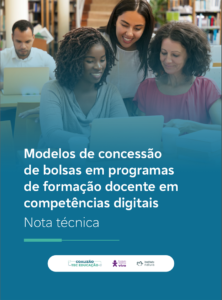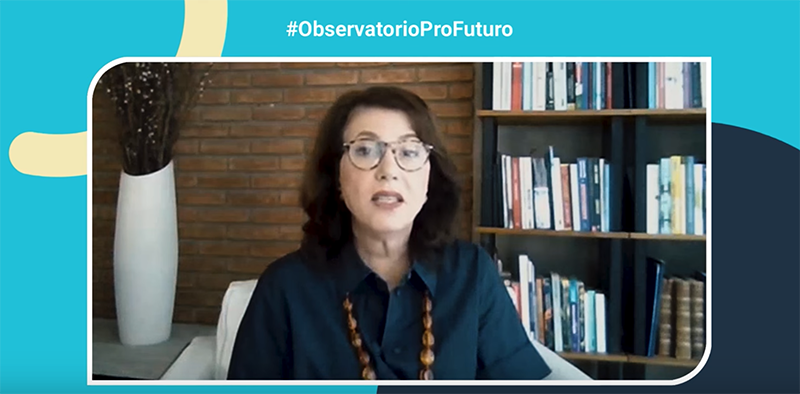The adoption of digital technologies in education has generated (and will generate) significant changes, offering new opportunities to reduce inequalities among students and ensure broader and more economical access to knowledge. In this context, developing digital competencies has become essential for young people to successfully meet the demands of the digital age. But, as we know, the effective incorporation of technology in education not only depends on the availability of technological resources but also on the proper training of teachers.
However, this training faces challenges such as the teachers’ initial education, lack of time, and barriers sometimes imposed by the educational system itself. To minimise these obstacles, the implementation of recognition policies that incentivise teachers has proven to be a positive factor contributing to the success of teacher training programs in digital competencies.
In this regard, Brazil is making progress in formulating and implementing policies and regulations for the adoption of technology in education, which includes a national strategy with provisions for resources for teacher training in digital competencies. Considering this context, the Tec Education Coalition, which includes entities such as CIEB, Fundação Lemann, Fundação Telefônica Vivo, Instituto Natura, and MegaEdu, has developed a proposal for incentive models, a type of scholarship for teachers who, in addition to their teaching duties, undertake the training of their colleagues. This proposal is based on the systematic implementation of the Teacher Training Program in Digital Competencies in Mato Grosso and the experience of another teacher training program implemented in the state of Paraná.
This article presents a summary of these models, their results, the costs of implementation in other states of the country, and the lessons learned from their use. For details, we recommend reading the full technical note here.

The Tec Education Coalition has developed a proposal for incentive models for teachers who, in addition to their teaching duties, undertake the training of their colleagues.
Multipliers in Mato Grosso
The scholarship proposal implemented in the state of Mato Grosso focuses on the implementation of the teacher training program in digital competencies, framed within the “Pact for Digitalisation,” a state government policy integrated into the “EducAção 10 years” program. This program aims to improve learning quality in the teaching network through the development of teachers’ digital competencies. The program is structured around two fundamental pillars:
- Training Paths: The program is structured into various training paths. Each path offers up to 66 hours of training, distributed across courses in different areas such as pedagogy, digital citizenship, and professional development, delivered in a hybrid format including webinars, self-instructional modules, and in-person workshops.
- Multipliers: The multipliers are teachers specifically hired to replicate the training and extend the program’s reach. They are a key element, acting as focal points and mediators in the training sessions.
Distribution of Scholarships
Two types of scholarships were awarded: Type I for technological trainers and Type II for multipliers. Type I scholarships entail a weekly workload of 14 hours and a monthly remuneration of 2,500 Brazilian reals (about 440 dollars), while Type II scholarships require a weekly workload of 10 hours and a remuneration between 1,500 and 2,500 reals (265 to 440 dollars).
The distribution of scholarships in Mato Grosso was carried out according to specific criteria to ensure that different educational regions received a proportional amount of resources relative to the concentration of teachers.
Results
Preliminary results showed a significant improvement in teachers’ digital competencies. The proportion of teachers with an adequate level of digital competencies (level 3 or higher on a scale of 1 to 5) increased from 25% to 53%.
Scalability, Costs, and Feasibility
The estimated monthly cost for funding the multipliers’ scholarships was 255,000 reals per month (45,068 dollars), equivalent to 3.06 million annually (540,800 dollars).
Considering that Brazil has 510 geographical regions and that two Type I multipliers are needed per region, 1,020 Type I multipliers would be required, amounting to 2.55 million monthly (450,700 dollars) and 30.6 million annually (5,408,271 dollars).
Regarding Type II multipliers, considering that Mato Grosso represents approximately 2.4% of the total number of teachers in Brazil and used 120 Type II multipliers, an estimated 5,000 Type II multipliers would be needed nationwide, with a total cost of 7.5 million monthly (1,325,556 dollars) or 90 million annually (15,906,681 dollars).
In total, adding the resources needed for the two types of multipliers, we get a figure of 120.6 million reals (21,208,908 dollars) for the entire country.
Considering that the National Strategy for Connected Schools (ENEC) has a budget of 2.3 billion (406,504,070 dollars), this scholarship model is feasible and could be funded with these funds to support digital competency training initiatives.
Trainer Tutors in Paraná
How Does the Program Work?
Initiated in 2020 in response to the COVID-19 pandemic, the “Formadores em Ação” program was designed to offer teachers technology-mediated training, based on the concept of “teacher-to-teacher” or peer training.
The training program is structured on a quarterly basis with weekly virtual sessions of 1 hour and 40 minutes, totaling 40 hours per quarter. Sessions are held via Google Meet, and study groups are composed of up to 20 teachers from different schools and regions. Participation in the groups is voluntary and re-evaluated each quarter to ensure continued commitment.
The trainers in this program are selected through a public call process and receive initial training from the Department of Education (SEED) and designated tutors, also network teachers. Each tutor is assigned to a group of trainers (up to 10) and provides ongoing pedagogical assistance. Once trained, each trainer coordinates up to three study groups.
The scholarship system of the “Formadores em Ação” program is designed to incentivise and support trainers who actively participate in training other teachers.
Costs and Scalability
Each trainer receives a monthly scholarship of R$ 1,540.48 for their participation in the program. This compensation is intended to recognise the additional effort involved in coordinating and conducting training sessions.
Assuming that in 2023, 523 trainers were needed to serve 5,367 groups, a monthly cost of 805,000 reals (142,276 dollars) per month and 9.6 million (1,696,712 dollars) per year can be calculated.
The number of trainers needed for the program’s operation is directly proportional to the total number of state network teachers that need to be served. Considering that state network teachers in Paraná represent 6.8% of Brazil’s basic education teachers and that the estimated cost to reach that percentage is 9.6 million, it can be inferred that the cost to expand the program nationwide would be approximately 142 million (25,097,208 dollars) per year.
What Can We Learn from These Models?
The experiences of Mato Grosso and Paraná provide us with some important lessons that can be considered success premises for implementing a state scholarship program to teach digital competencies to teachers. What are these lessons?
- Ensure the necessary infrastructure: Ensure connectivity and availability of technological equipment for the development of digital competencies.
- Conduct initial diagnostics: Implement diagnostics that demonstrate the maturity level in the pedagogical use of technologies. Tools such as the Guia EduTec can be used for efficient and systematic self-assessments.
- Continuous evaluation: Implementing recurrent evaluations is crucial to adjust the training according to the regional context and specific needs of educators.
- Availability of workload: To enable educators to effectively participate in training programs, it is necessary to ensure that they have the available workload. This implies proper planning of their work schedules and a specific allocation of time for continuous training. It is important that educational institutions recognise and facilitate this time dedicated to professional development, avoiding overloading educators with other responsibilities that may interfere with their participation in training.
- Collaboration regime: Foster collaboration between education departments and municipalities is vital for the effective implementation of training programs. This collaboration should be based on open communication and efficient coordination, ensuring that all involved parties work towards common goals. Additionally, clear support mechanisms and shared resources need to be established to facilitate the implementation and monitoring of training programs in different regions.
- Establish collaboration initiatives: Promote collaboration between different educational and technological actors to support the development of digital competencies.






